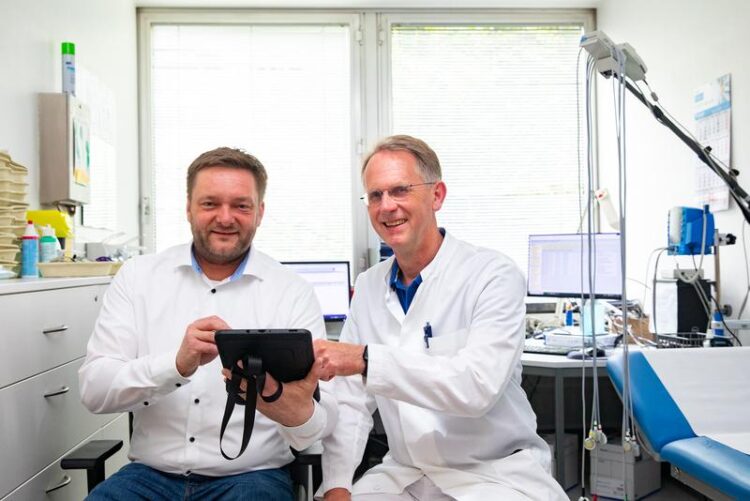ACRIBiS: Individual risk assessment for cardiovascular diseases

Dr. Matthias Gietzelt (left) and Professor Bavendiek in a cardiology examination room.
Copyright: Karin Kaiser / MHH
MHH Cardiology participates in a nationwide project to improve risk assessment thanks to structured and standardized data.
Digitization in the healthcare sector is intended to improve patient care and simplify workflows in clinics and practices. This is also the goal of the large-scale ACRIBiS project. Here, 15 German research institutions want to jointly advance personalized risk assessment for cardiovascular diseases and improve the prevention, diagnosis and therapy of these diseases. ACRIBiS is an application project of the Medical Informatics Initiative (MII) of the German Federal Ministry of Education and Research (BMBF). The University Hospital Bonn is the overall coordinator. The Department of Cardiology and Angiology of the Hannover Medical School (MHH) is co-coordinating the project together with the University Hospital of Würzburg.
Standardized and structured data collection
“In order to assess the personal risk of a heart attack, for example, one finds a lot of data, values and images in different systems and documents for each patient. But so far there is no tool in which all of this is stored and can be retrieved in a complete and structured way,” says Professor Dr. Udo Bavendiek, senior physician at the Department of Cardiology and Angiology at the MHH, giving an example of the current situation. He is responsible for the clinical coordination of all partners in the overall project and for ACRIBiS at the Hannover site and would like to change this unfortunate situation. As part of the project, clinical data from a total of 4,500 patients nationwide will be recorded in a standardized and structured manner. This should facilitate clinical work in the future and create a new data set that is comparable across all sites, enabling more accurate risk assessments and detailed analyses for improving patient care and scientific projects.
Involving those affected
The data will be collected at all participating cardiology clinics. “We here at the MHH Clinic for Cardiology and Angiology want to record the risk parameters directly when patients take their medical history,” explains Professor Bavendiek. Risk parameters for cardiovascular diseases include blood pressure, blood sugar, tobacco consumption, cholesterol and body weight. But many other things are also recorded. Patients are actively involved – they are asked to answer questions about their health on a tablet. All data is validated by the doctor and defined text modules are automatically inserted into the doctor’s letter – making the work much easier for those treating the patient. “Less ‘text work’ means more time for patients,” emphasizes Professor Bavendiek. However, the structured medical history also has advantages for patients. With the data, a better individual risk assessment for diseases is possible. “In addition, we can also show them graphically by what percentage they can reduce the risk, for example, by changing their lifestyle,” explains Professor Bavendiek. This motivates those affected to do something for their health themselves.
Improving patient care
The clinical data is not only recorded in a structured and standardized manner at the individual sites, but is also linked to so-called biosignals such as the electrocardiogram (ECG). This combination makes risk assessment even more precise. With the help of artificial intelligence, patterns are to be recognized and information obtained that doctors can use to improve the prevention, diagnosis and treatment of diseases of the cardiovascular system. The researchers also hope that the project will provide entirely new insights into the diseases.
Clinicians and computer scientists working together
Clinicians and computer scientists are working closely together in the nationwide project. At MHH, the Peter L. Reichertz Institute for Medical Informatics is the cooperation partner. “Before patient data is collected, we have to create the technical infrastructure for it,” says Dr. Matthias Gietzelt, head of the Medical Data Integration Center at MHH. “In the process, of course, we also use the structures already in place at the Medical Informatics Initiative.” As in Hannover, IT structures are being created at all participating sites in which data can be stored in such a way that the same automated risk assessments and complex analyses will ultimately be possible across all sites. ACRIBiS has potential for expansion. “Although the project is about cardiovascular diseases, the approach and experience can certainly be transferred to other clinical subjects,” Professor Bavendiek is certain. The BMBF is funding ACRIBiS with a total of around nine million euros over a period of four years.
The short title ACRIBiS stands for “Advancing Cardiovascular Risk Identification with Structured Clinical Documentation and Biosignal Derived Phenotypes Synthesis.”
SERVICE:
For more information, contact Professor Udo Bavendiek, MD, bavendiek.udo@mh-hannover.de, phone (0511) 532-2229.
Media Contact
All latest news from the category: Health and Medicine
This subject area encompasses research and studies in the field of human medicine.
Among the wide-ranging list of topics covered here are anesthesiology, anatomy, surgery, human genetics, hygiene and environmental medicine, internal medicine, neurology, pharmacology, physiology, urology and dental medicine.
Newest articles
Faster, more energy-efficient way to manufacture an industrially important chemical
Zirconium combined with silicon nitride enhances the conversion of propane — present in natural gas — needed to create in-demand plastic, polypropylene. Polypropylene is a common type of plastic found…

Energy planning in Ghana as a role model for the world
Improving the resilience of energy systems in the Global South. What criteria should we use to better plan for resilient energy systems? How do socio-economic, technical and climate change related…

Artificial blood vessels could improve heart bypass outcomes
Artificial blood vessels could improve heart bypass outcomes. 3D-printed blood vessels, which closely mimic the properties of human veins, could transform the treatment of cardiovascular diseases. Strong, flexible, gel-like tubes…





















